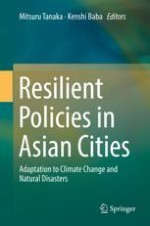2020 | OriginalPaper | Buchkapitel
3. Civil Indicator: General Public’s Cognitive Structure of Policies for Making Resilient Cities
verfasst von : Kenshi Baba, Kosuke Shirai, Mitsuru Tanaka
Erschienen in: Resilient Policies in Asian Cities
Verlag: Springer Singapore
Aktivieren Sie unsere intelligente Suche, um passende Fachinhalte oder Patente zu finden.
Wählen Sie Textabschnitte aus um mit Künstlicher Intelligenz passenden Patente zu finden. powered by
Markieren Sie Textabschnitte, um KI-gestützt weitere passende Inhalte zu finden. powered by
